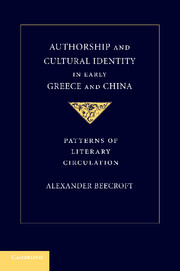Book contents
- Frontmatter
- Contents
- Acknowledgments
- Introduction
- 1 Explicit Poetics in Greece and China: Points of Divergence and Convergence
- 2 Epic Authorship: The Lives of Homer, Textuality, and Panhellenism
- 3 Lyric Authorship: Poetry, Genre, and the Polis
- 4 Authorship between Epic and Lyric: Stesichorus, the Palinode, and Performance
- 5 Death and Lingerie: Cosmopolitan and Panhuaxia Readings of the Airs of the States
- 6 Summit at Fei: The Poetics of Diplomacy in the Zuozhuan
- 7 The Politics of Dancing: The Great King Wu Dance and the Hymns of Zhou
- Conclusion: Scenes of Authorship and Master-Narratives
- Bibliography
- Index of Passages Cited
- General Index
4 - Authorship between Epic and Lyric: Stesichorus, the Palinode, and Performance
Published online by Cambridge University Press: 03 May 2010
- Frontmatter
- Contents
- Acknowledgments
- Introduction
- 1 Explicit Poetics in Greece and China: Points of Divergence and Convergence
- 2 Epic Authorship: The Lives of Homer, Textuality, and Panhellenism
- 3 Lyric Authorship: Poetry, Genre, and the Polis
- 4 Authorship between Epic and Lyric: Stesichorus, the Palinode, and Performance
- 5 Death and Lingerie: Cosmopolitan and Panhuaxia Readings of the Airs of the States
- 6 Summit at Fei: The Poetics of Diplomacy in the Zuozhuan
- 7 The Politics of Dancing: The Great King Wu Dance and the Hymns of Zhou
- Conclusion: Scenes of Authorship and Master-Narratives
- Bibliography
- Index of Passages Cited
- General Index
Summary
In one of the most fascinating moments of the intersection of philosophy and poetry in ancient Greek literature, Plato has his Socrates correct himself in the Phaedrus after having delivered a speech exhorting young men to give themselves to non-erasteis rather than to erasteis. In so doing, he wades into the debate about whether or not Helen actually went to Troy, a debate with serious implications for Panhellenic epic:
So, my friend, I need to be purified. There is an ancient purification for those who have erred in the telling of myth (muthologia), one that Homer did not perceive, but Stesichorus did. For when he was robbed of his eyes because of his slander of Helen, he was not ignorant like Homer, but because he was close to the Muses (mousikos) he knew the cause, and composed immediately,
This is not a true story,
You did not embark in the broad-benched ships,
You did not reach the citadel of Troy.
And when he had created the whole of the so-called Palinode he recovered his sight immediately.
ἐμοὶ μὲν οὖν, ὦ ϕίλε, καθήρασθαι ἀνάγκη· ἔστιν δὲ τοῖς ἁμαρτάνουσι περὶ μυθολογίαν καθαρμὸς ἀρχαῖος, ὃν Ὅμηρος μὲν οὐκ ᾔσθετο, Στησίχορος δέ. τῶν γὰρ ὀμμάτων στερηθεὶς διὰ τὴν Ἑλένης κακηγορίαν οὐκ ἠγνόησεν ὥσπερ Ὅμηρος, ἀλλ᾽ ἅτε μουσικὸς ὢν ἔγνω τὴν αἰτίαν, καὶ ποιεῖ εὐθὺς –
Οὐκ ἔστ᾽ ἔτυμος λόγος οὗτος,
οὐδ᾽ ἔβας ἐν νηυσὶν εὐσέλμοις,
οὐδ᾽ ἵκεο Πέργαμα Τροίας·
καὶ ποιήσας δὴ πᾶσαν τὴν καλουμένην Παλινῳδίαν παραχρῆμα ἀνέβλεψεν.
(Plato, Phaedrus 242a2–b3)- Type
- Chapter
- Information
- Authorship and Cultural Identity in Early Greece and ChinaPatterns of Literary Circulation, pp. 144 - 170Publisher: Cambridge University PressPrint publication year: 2010



